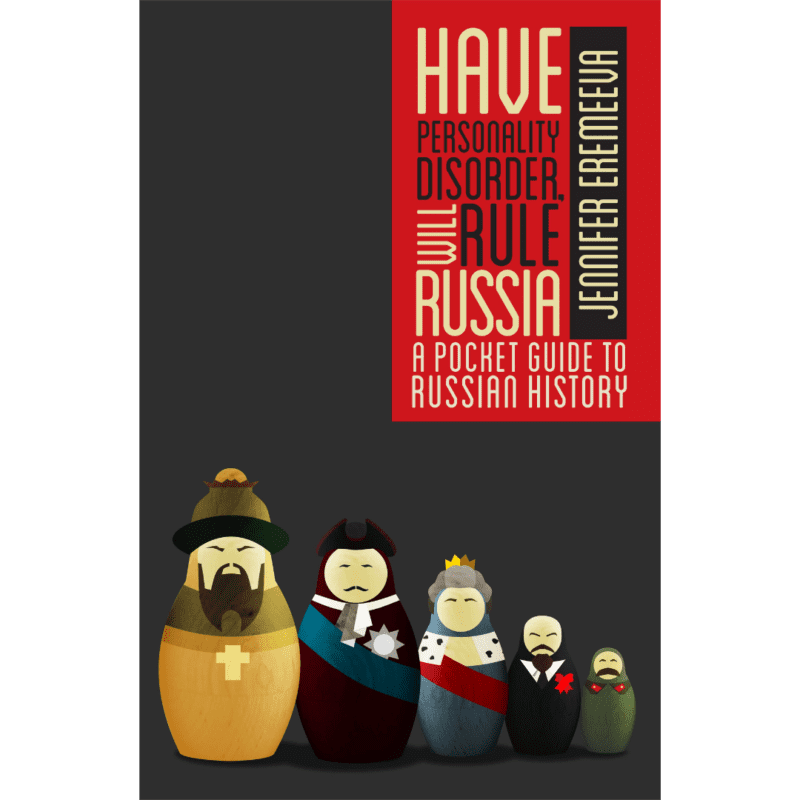Here’s one of the great unsolved mysteries of the universe: why does the Alumni Magazine get through the floundering Russian postal system with a regularity you can set your clock by, but The New Yorker almost never appears? Why isn’t it the other way round? Still, fresh reading material in Moscow should never be taken for granted, so when it comes, I give the Class Notes a summary glance before I consign the magazine to the trash. The Class of 1984 seems to be doing well. Many of my classmates are approaching the zeniths of their professional lives – or at least those who write in are. Some are doctors, some are lawyers and an overwhelming number are in the financial world. Most are married by now and have a matched set of tow-headed children with androgynous names like Madison or Brooks, who screw up their eyes against the late summer sun of Nantucket, strategically splayed in their parents’ laps to mask any middle-age spread.
I’m not a great one for sending in regular contributions to the Class Notes. The last time I submitted anything to the Alumni Magazine was back in my banking days: a picture of me “enjoying a joke at the Russian Economic Forum” with the Duke of York. I consider how I might update it without suggesting entropy:
“Jennifer (Buttenheim) Eremeeva ’84 is still living Moscow, Russia with her husband, HRH (Leningrad Officers’ Cadet School # 401, class of ’86) who is the Deputy CEO at A Difficult Start Up he’s asked her never to write about, and daughter, Velvet, 12. Jennifer has abandoned attempts at working in Russia’s Formal Economy and is currently employed full-time as a Domestic Goddess.”
I never set out to be a Domestic Goddess. I cannot even remember wanting to learn to cook, and I certainly never intended to become an expert on Russian food. I was going to be Ambassador to Russia. How did that happen? Even more bafflingly, when did that happen? Recently, like good Domestic Goddesses do, I held a massive clutter-bust and gave away all my high heels and navy blue banker suits. Today my wardrobe consists of a different pair of yoga pants for each day of the week. Suddenly, I know how to make kvass — kvass of all things! I write a popular food blog about “Culinary Adventures in the Russian Capital.” I photograph blini. Magazine editors from The United Arab Emirates inexplicably want my borscht recipe.
Katya, my Russian émigré friend from New York, sent out an urgent all-points bulletin the other day on Facebook.
“Friends,” she urged in two languages, “what is the correct culinary translation for ‘salo’?” I didn’t miss a beat.
“Salt pork or lard,” I typed back automatically.
Okay, I haven’t gone so far as to believe that my (excellent) strawberry jam contains the same medicinal value as penicillin, but lately, my attitude towards buckwheat verges on the zealous. No, I never planned to become a Domestic Goddess, but in two decades, Russia, it seems, has turned me into just that.
The Domestic Goddess Incubator
In 1992, I moved to Moscow to live full-time with my boyfriend, whom I later married. I call him “HRH,” which I tell him stands for “Handsome Russian Husband,” but I sometimes alter it to mean “Horrible Russian Husband.” He calls me Petrovna, since my father’s name is “Peter.” Everyone should have a patronymic.
“Marrying a Russian man,” people comment with surprise, “that’s unusual – normally it’s the other way round.”
It is unusual. And here’s the other thing: It isn’t the same thing as when a foreign man marries a Russian woman. In fact, the only thing we have in common is that we name our daughters “Sophia” and our sons, “Alexander.” Apart from that – it’s like comparing apples and gasoline stations. One crowd is legion: you can find a Natasha Smith in one out of five Starlite Diner booths, but running a Jennifer Eremeeva to ground is increasingly more of a challenge, as divorce and separation decimate our numbers at an alarming rate.
The foreign man, let’s call him Bill, who marries Natasha is welcomed into her family enthusiastically with open arms no matter what his age or circumstances. As long as Bill can chew gum and walk a straight line – a straight line to the Embassy that is — to fill out the paperwork for a fiancé visa, he’s a member of the family now. Molodyets, Natasha! Natasha moves into Bill’s well-appointed flat on the Pond, lowers her heels and tones down her fingernails. When Bill’s contract is up and he whisks Natasha off to Connecticut or Cumbria, that’s considered the logical next step, and a step up at that. Bill and Natasha have made an equitable exchange of commodities and look likely to live happily ever after.
When we meet and fall in love with our HRH – let’s call him Boris – matters do not unfold quite so smoothly. We may be Bill’s equal on paper or in the boardroom, but we are leagues below him in the Russian marriage stakes. We tend to speak better Russian than Bill does, but never quite well enough for our Russian mothers-in-law. These tough-cookie Russian ladies, who are happy to grin idiotically at Bill, find it harder to discuss politics with us. Foreign daughters-in-law are suspicious creatures. We work. We eschew potatoes. We expect their sons, men brought up to believe they actually are the scion of some royal house, to help us unload the dishwasher. We are reckless with our health: we put ice in our drinks and air conditioning in our apartments. We sit on stone walls or metal chairs, thereby rotting our reproductive plumbing. We marry woefully late (around 28) which means that by the time we do get around to having children (30-35) we are way past any expectation of normal gestation or pregnancies. We expect Boris to be with us in the delivery room, rather than boozing it up at home with his mates. When we miraculously do give birth to Sophia and Alexander, we don’t automatically hand them off to the older generation. If career advancement isn’t obvious, we have to think strategically about whisking Boris back to Boston or Brixton, because it might not be a win-win. Boris could well prove unsuited to being a stay-at-home dad, and before we know it, Babushka and Dedushka could be buying one-way tickets to our spare room.
HRH and I have managed to avoid these pitfalls. We are still together thanks to a bundle of seemingly random factors. The introduction of the DVD is one, since we can watch movies in my language while the subtitles appear in Russian for HRH. The badly dubbed Gorbushka VHS tapes I finally threw out last year almost did us both in. We are still together because he is the one who works in the cutthroat Russian Formal Economy while I stay at home and battle writer’s block in yoga pants. I can’t see it working the other way around. And, despite my mother-in-law’s worst fears, I have become a Domestic Goddess, which is exactly what most Russian men expect from their wives.
When we moved in together, I knew slightly more about cooking than HRH, which was to say nothing at all. As I was female, the task naturally fell to me, just as gassing up the car did to him. From each according to his ability, to each according to his needs, right? My first culinary laboratory was a modest affair, located in Northern Butova (Southern Butova being then only a vague sketch on a drawing board), that uncharming environ most expats only glimpse fleetingly on the way to Domodedevo Airport. HRH had his apartment and propiska there, so that is where we lived.
Now I am glad we did. When Russians or those funny expats who have gone native start talking about over-privileged foreigners, I reel out a few well-honed anecdotes about our happy years in Northern Butova and that tends to shut them up. Northern Butova was — and still is — a scale model of Hell: an inelegant, sloppily thrown together sprawl of pre-fab buildings, painted in what must have seemed like optimistic shades of garish pastel blue, yellow, and green, but which instantly faded into depressingly dingy versions of the original hues. As Butova and its ilk rose from the ashes of the Former Soviet Union to meet the ravenous post-perestroika housing demand, it took the public transportation system a decade to catch up. In my day, to reach Butova, one took the distinctly proletarian Orange Line to its southernmost end, and then waited way too long for Bus # 813 (a number engraved on my heart) and then crammed into it with 300 other people and rattled and bounced until the end of its route, some 35 minutes later. That was Northern Butova.
The Domestic Goddess incubator in Northern Butova had a sink along one wall, a stove suspended in limbo on the other, with a fridge strategically placed to impede entry to and from the kitchen. No cabinets and not a single millimeter of counter space. It was not the classic kitchen triangle. HRH, just fresh from military school, had spent all his money on a set of faux leatherette armchairs that looked like alien space craft, not on cooking utensils. I think of the kitchen in Northern Butova often these days, as I cram paella pans, shrimp de-veiners, and melon ballers into my oversized duffle bags for a trip back to Moscow. Back then, we had two ugly enameled metal cooking pots and three or four mismatched Czechoslovakian plates with way too much gold leaf. We had a lot of barware of course, complete sets of shot glasses, champagne flutes, and tumblers, all in hideous smoky glass. It was appropriate that our glasses outnumbered our plates, since there wasn’t much food in the mid-1990s: we lived on Pasta Carbonara, which I improvised using Rossiiskiy cheese and tinny-flavored faux ham. This was the first of many culinary revelations for HRH, who had hitherto only eaten pasta in “makaroni po flotsky,”a military staple. His mother, up from Kiev for an awkward weekend, was appalled.
“My son has forgotten what a potato is,” she wailed up and down the musical scale. She and I will never see eye to eye on matters culinary.
Those were the roller coaster years, about which my contemporaries are starting to write books that are disturbingly shelved under the “history” section of the library.
“Gosh, you must have seen lots of changes,” people in the West say when I rattle off my CV.
I nod and say “Yes, amazing changes.”
They were amazing, those changes: the second coup; the currency reforms (I invested my soon-to-be-invalid rubles conservatively in a case of “Brut” champagne at the old prices); Moscow Mayor Luzhkov and his bullet-proof flat cap; Vladimir Gusinsky (before he was an exiled oligarch); NTV (when it was still owned by Gusinsky); “Kinder Surprise” (what the people called Prime Minister Sergei Kiriyenko); and Yeltsin’s escalating dipsomania. I remember them all, but in my mind’s eye, it is all soft-focus background. In the foreground, in sharp focus, are Domestic Goddess milestones, like the time I found fresh ginger in the market for the first time. I felt as if the horizon had suddenly expanded five-fold. Or when IKEA first opened its doors, and Russians in hushed silence wandered its logically laid out pathways as if it were the Grand Kremlin Palace
As we geared up to become parents, HRH and I agreed that it was time to leave the Orange Line. I lobbied hard for the Green Line, to which I retain an affectionate affinity to this day. A big part of that was Leningradsky Market, and once we moved within walking distance, Velvet and I became regulars. The Market was full of sights, sounds, and smells that cut through the gray gloom of a Moscow winter. More Mediterranean than Slavic in their outlook, the market vendors seemed glad to see us, or at least did a credible imitation of being so. Slowly but steadily, with fresh meat, produce, herbs, and eggcups of pungent spices from the one-armed Uzbek spice merchant, I gained confidence in the kitchen. Recipes with unavailable or hard-to-find ingredients became irresistible puzzles to solve. Interest became passion. I made plyov, I made pesto, and I made apricot baby food for Velvet. I did a turkey. I contemplated attempting a whole suckling pig. I still do.
Cooking gradually became therapy. There was so much I could not control about my life in Russia: the messy politics, the volatile economy, the traffic snarls, and the disturbing rise of anti-foreign feeling. But in the kitchen, the food did exactly what I told it to. Without a prikaz, a combination of eggs, flour, butter, and salt rose obediently into a lofty soufflé. I needed no spravka to fit the right blade in the food processor and mix lemon juice, mustard, vinegar, and oil into vinaigrette. Things were straightforward in the kitchen: a recipe for Chicken Marbella never left me with the uneasy sense that someone had insinuated something menacing in a subtle Slavic way I was too dense and too American to understand. Corruption, when it happens in the kitchen, is easily dispatched down the disposal, its lingering smell eliminated with a few sprays of vinegar and water and a firm swipe of the counter.
Becoming a Domestic Goddess is largely a question of trial and error, and my journey was full of both. There was the duck that a shifty poultry salesperson sold me without removing the quills, resulting in an all-night battle with a pair of tweezers and a magnifying glass before I gave up and defrosted some chicken breasts. There was the strawberry sorbet that refused to freeze (strategically repurposed into daiquiris at the very last moment) and there was the Thanksgiving I tried to go to the St. Andrew’s Ball the night before and cook a meal for nine the next day. You can do one, or the other, but not, I learned, both.
Adventures in Multi-cultural Child Rearing
Domestic Goddesses must also be exemplary mothers to their offspring, surrounding them with love, appropriate reading material, creative outlets and regular, healthy well-balanced meals. Raising a bi-cultural child presents its own special challenges. There is the language issue to tackle early on. When she grows up, I imagine that Velvet will say to her therapist, “Yeah…well, Mom and Dad didn’t really speak the same language…” at which point I hope that she will qualify the statement by explaining that I speak English to HRH and he lobs back a reply to me in Russian. It’s a trifle odd, but this way, Velvet is bi-lingual and neither of us ends up sounding Ricky Ricardo or Gloria from “Modern Family.”
I’ve worked hard to balance Velvet’s exposure to her two cultures. She knows about “a quiet old woman whispering hush,” and “twelve little girls in two straight lines,” as well as “Yerulash.” Geographically based in Russia, I scoured the expatriate community for American experiences, going in for things I would never have considered if I had been living in the U.K. or U.S.A. We joined a renegade Girl Scout troop run by some of my working mom friends that met at the massively inconvenient hour of 5:00 p.m. on Sunday nights. I sat with fellow mom, Liz, at the back of the room for the first session as Linda, our zealous leader, took the girls through the Girl Scout pledge.
“Does this strike you as…well, as a little fascist?” I whispered to Liz.
“A little?” she responded, raising her well-manicured brows.
“Do you think there will be cookies?” I asked hopefully.
“Never,” affirmed Liz, who worked for a large FMCG (fast-moving consumer goods) company, “Even Linda couldn’t get Girl Scout cookies through customs.”
Halloween candy and costumes, on the other hand, were easily stashed in suitcases winging their way back to Moscow after summers in the United States. Each October, I ignored Babushka’s grunts of disapproval as Velvet, dressed up as a bumblebee, a fairy princess, or Hermione Granger headed off to Rosinka to trick-or-treat in the late autumn snow. I shocked the neighbors by placing carved pumpkins in the windows overlooking Leningradsky Prospekt. Each December, HRH and I tiptoed around the confusing information about Dyed Moroz and Santa Claus, assuring Velvet that they were distant cousins who both lived in the utter North. She kindly played along with it way into her double digits, garnering twice the number of gifts.
Domestic Goddesses must also be exemplary pillars of the Parent-Teacher Association of their children’s school. I sustained this role on my own without help from HRH, which I deserved because it was my idea that Velvet go to an English-speaking school, letting myself in for seven years of tight-lipped disapproval from all four grandparents and raw outrage from HRH about the rank inadequacy of the school we chose. I agreed with them. It was awful, but repeated attempts to change schools failed.
Events at Velvet’s school were rare and lukewarm affairs. Each September, they staged a half-hearted attempt to invite parents to meet the teachers. This lasted for about twenty-three minutes and included a cup of substandard Turkish Nescafe. Frankly, Russia’s national airline has better service than Velvet’s school. The British teachers stood in a wary clump on one side of the multi-purpose room, braced for impact, while the parents arranged themselves in equally wary ethnic groups at the other end. I huddled together with my friend Claudia, whose own HRH was equally disinclined to attend anything at school. Together, we formed a tiny American island in an ocean of earnest Korean women, who clutched their Louis Vuitton Speedys and cast nervous looks at the leather-trouser clad, sleek 27-year-old Russian mums who teetered on four-inch heels, and flicked their hair extensions back from their collagen sculpted faces as they air kissed each other.
I tried hard to up my Domestic Goddess game at these events, but as I was not from Scotland, there was little scope. The Scotch mums had a death grip on parent participation at Velvet’s school. They organized sports days, afternoon discos, and the annual Bacchanalia of International Day. International Day was the school’s lackluster attempt to celebrate the diversity of the student body. The children wore their national costumes for a little concert, followed by a communal lunch of everyone’s national dish. As always on such occasions, I tried hard to achieve an equitable division of Velvet’s two cultures. She dressed Russian, in a lovely traditional red sarafan, and elaborately beaded kokoshnik, which I felt altogether more flattering than any Annie Oakley, Laura Ingalls Wilder, or Pocahontas get up. I cooked American: bringing in a large plate of chocolate chip cookies, which is a bit of a Domestic Goddess rabbit out of the hat, since there are no chocolate chips in Russia. I cleverly substituted M&Ms. To underscore our ethnic origins and get into the spirit of International Day, I stuck little American flags into the cookies. I found the effect festive, and was pleased until I overheard one Scotswoman, who had brought (store-bought) shortbread say to another, who had sent her three sons to school in plaid skirts with what looked like very sharp knives dangling over their genitalia, “Isn’t that the most ridiculous thing you ever saw?” I did not love the Scotch mafia.
One International Day stands out clearly in my memory. Claudia and I perched on the undersized chairs at the back of the multi-purpose room, and noted with interest that the 27-year-old Russian mums were out in fuller force than usual. In a bold move, they had occupied the first rows of chairs, which was normally the unspoken territory of Scotch mafia. These stalwart, tartan-clad Highlanders had retreated slightly, to the right side of the audience, and both groups were casting each other killer looks. It was exactly like a very awkward wedding where the bride and groom are from two distinctly different ethnic and religious groups.
The Head Teacher, Mr. Leighton, appeared from stage right, and loped somewhat unevenly on to the platform. Claudia and I dug our elbows into each other. We both found Mr. Leighton a deeply unsatisfactory Head Teacher. We were never completely convinced he was sober at school events, and we found his lengthy speeches borderline offensive. I often wondered what the training program for Head Teacher in Schools Abroad consisted of, but I was pretty sure that the syllabus had been formulated during the heyday of the British Raj, since Mr. Leighton’s speeches had one theme: how Great Britain (still) ruled the world. This pissed everyone off. It annoyed us Americans because we knew we ruled the world. It ticked off the Russians, who were getting an increasingly urgent message from the Kremlin that Russia actually ran the world. It frustrated the Korean crowd, because it took up too much camcorder battery time, and it even irritated the Scots, who made a distinction between Scotland and Great Britain. The only constituents who seemed to enjoy it were the three Bangladeshi families, who considered themselves very much part of Britain through their membership in the Commonwealth. There were no actual Britons to appreciate Mr. Leighton’s patriotic ranting, of course, since they all went to The Other School.
But there was Mr. Leighton, in his objectionable, grubby, mustard-colored corduroy suit, revving up for another diatribe in his flat, distinctly down-market Birmingham accent, which rendered the word “parents” into “pay-rents” – which, at €17,000 per annum, was exactly what we were.
“Good afternoon, pay-rents,” he cooed, slapping one hand rather too loudly against the other, “Announcements first: We will be having two after-school clubs,” continued Mr. Leighton with a supreme effort, “Mr. Pillock-Downes will be offering Morris Dancing on Tuesdays-“
There was a commotion as the ringleader of the 27-year-olds rose on her four-inch heels in one fluid, enviable gesture.
“I veesh to kuh-no,” she began in heavily accented English, “Vat you will be doing with zuh…kak skazat’ ‘ploshadka’…?” She fumbled for the word.
“Playground.” I sang out loudly, realizing where she was going, and this earned me a few nods and even the occasional flash of expensively whitewashed teeth from the 27-year-olds.
“Zank you: playground,” said Four-Inch Heels, “Zis playground is terrible—“
“Yes,” said another 27-year-old, leaping to her feet in another fluid gesture that reminded me it was high time to visit the new Pilates Studio on Tverskaya-Yamskaya. She joined the three-inch purple talons of her forefinger and middle finger together against her thumb and waggled her wrist up and down in the classic Russian gesture of emphasis.
“And, you know, this kindergarten next door which is…” here she looked at her friend for help, “gosudarstvitnnaya…?”
“State?” Claudia offered.
“State’s good,” I agreed, and gave a nod to Purple Talons and Four-Inch Heels, “State.”
“State,” said Purple Talons nodding her hennaed head vigorously, “Zank you very much. Zis playground is much nicer. But we pay?” Purple Talons heaved a massive Slavic shrug, meant to convey that the school had visited upon her the cumulative suffering of the Tartar Mongol Yoke, The Napoleonic Invasion and the years 1917-1945. “Vhy?” Both women sat down, crossed their arms defensively, and looked at Mr. Leighton.
What did they expect him to say? His pasty face turned the color of his grubby mustard suit, and he moved rubbery lips up and down, but no sound came out. He cast his eyes wildly around the room, and then finally looked in abject panic to the Scotch contingent. Fiona MacQuihrr sighed, moved her bottom into a leveraging position, and hauled herself awkwardly up on to her hindquarters.
“She’s the one who thought my American flags were ridiculous,” I whispered to Claudia.
“Wench,” Claudia said.
In a thick Glaswegian brogue I felt was going to be impossible for Russian Moms, the Koreans, or indeed even Claudia or me to decipher, Fiona wrested control of the meeting:
“We will be orrrrrganizing a Brrrringg and Buy in April of outgrrrrrroooan clothes and used boooooks to rrrraise funds for the new playground equipment,” she began.
“Sorry…sorry,” said Purple Talons standing again, shaking her hair extensions vigorously. “I kuh-no zis Bring and zis Buy. No more. Vee will bring, and we will be buying. Vee have decided… and I vant to say you zat my husband is sending his…oborudovaniye?” she looked back at Claudia and myself questioningly.
“Holy cow,” breathed Claudia softly.
I fixed Fiona MacQuihrr with a revengeful gaze before enunciating clearly for the benefit of the room. “Equipment.”
Mr. Leighton turned a deeper shade of mustard.
“Yes, zank you, hees ekvipment, and vee vill make the play ground, because I don’t zink othervise you get it done.” She sat down and crossed her whippet thin thighs defensively.
The Koreans looked baffled.
“Which one is her husband?” whispered Claudia to me, “The one with three chase cars and the body guard?”
“No,” I said, trying to summon a visual, “I think he’s the one with the square jaw who lives in Triumph Palace on the 54th floor. Didn’t your kids go to the birthday party they had for the entire school last year? The one with the caviar and Tatu?”
“Right,” said Claudia.
“I dinna think –“ began Fiona MacQuihrr in an effort to wrest control back to her side of the multipurpose room.
“Vat don’t you kuh-no?” demanded Purple Talons extending her open palm upwards towards Fiona. “Vat you vill sell? Old cloh-thes? In Raaaaasia, we do not buy the old cloth-thes.”
Here we go, I though, cultural collision course.
“Yes,” said Four-Inch Heels, rising again, “you think what? You think we cannot afford the new cloh-thes? Our childs is not the orphans to need the dirty old cloh-thes of the foreign childs!”
“Sveta,” murmured Purple Talons, “spokoino…calm please.” She turned around to the auditorium, “Sorry, I don’t mean to say your childs are dirty, but how do we kuh-no from where comes these old cloh-thes?”
“Yes,” insisted Four-Inch Hells, “they will have mikrobiy…?” she looked back at me.
“Germs,” I said with a tight-lipped apologetic glance at the Koreans.
“Germs…zank you very much. Okay, I no say your childs have zee germs but…” she tilted her head vaguely in the direction of the three Bangladeshi moms, “how do we kuh-no?”
“Uh-oh,” I said to Claudia, “this is getting out of hand.” She nodded. I signaled that it was time to leave and we heaved ourselves up from the tiny chairs as gracefully as we could and high-tailed it out. We would join a palace coup to oust Fiona MacQuihrr and Mr. Leighton, but neither of us was willing to translate racial slurs.
Racial slurs aside, I drove away with a new appreciation of the 27-year-olds. I had always considered them somewhat vapid – at best decorative – but I was happy to revise my opinion. Four-Inch Heels and Purple Talons were Domestic Goddesses of their own kind, and they had provided me with a mother lode of material to blog about.
Doing it Like Downton
Highly Successful Domestic Goddesses must publish. With this in mind, I started to blog in 2009, and I only wish there had been blogging back in the Northern Butova days. My blog attracted a fairly attentive and appreciative audience in Moscow and abroad, and I went in search of other opportunities to earn enough to keep myself in yoga pants. After careful research, I pitched a regular cooking column to the editor of one English-language publication.
“Yeah…well,” he drawled, when he arrived at Starbucks forty minutes after our agreed meeting time, “your writing doesn’t hold much relevance for our readers.”
I was seriously taken aback. Doesn’t everyone want to know the history of kvass?
“How not relevant?” I pressed.
“Well,” he drawled, “I mean, all you seem to do jet-set about and complain about your domestic staff…that’s not really relevant for our readers. What I’d really like is for you to spy on the people you have dinner with and write about that.”
I didn’t follow up with Snarky Editor Guy, but I think about our exchange a lot. I mainly think about it when I am up to my arms in Fairy Liquid hand washing the component parts of sharp-bladed kitchen appliances.
When she left Russia several years ago, Claudia bequeathed me her Italian espresso machine and housekeeper, Lena. Both proved excellent additions to the household, except for the fact that Lena is afraid of the espresso machine, so I have to dismantle it and clean it every day. For a Domestic Goddess, this is but the work of a minute, but the problem is that Lena’s fear extends beyond the espresso machine to include the blender, the juice maker, the rice cooker and the food processor. Don’t get me wrong – I don’t mind doing all of the scary dishwashing by hand, but it does cut into my jet-setting time.
HRH informs me that dealing with domestic staff, like cooking, should be the provenance of the lady of the house, so I try my best to deal with it efficiently and effectively. I fear, however, that I will never master this aspect of being a Domestic Goddess. I wonder sometimes if a Domestic Goddess should need so much help around the house, but Russia is a human-resources rich country, so like most families, we have a cleaning lady and a driver. Okay, full disclosure, we have two drivers, but one is for HRH’s work and the other is for everything else. The latter, Tolya, also serves the token man around the house. When he isn’t driving my in-laws to Auchan or me to Dorogomilovsky Market, Tolya changes the light bulbs, fixes the garbage disposal, and calls the plumber. He deals with that surly crowd who fixes things, he pays the cable bill, and does a host of other tiny jobs that would bring our household to a screeching halt if he didn’t do them. Tolya is the only person who truly understands how the Italian espresso machine works. He’s around a lot. We have Lena who cleans everything but the sharp-bladed appliances and often wants to settle down for a lengthy chat about the rising cost of buckwheat. We used to have a nanny for Velvet, who was super while Velvet was a toddler, but who got a little odd as Velvet got older. Lena and my mother-in-law were united in opposition to Nanny, but after I worked up the courage to let her go (a three-martini job) Lena and mother-in-law have fallen out over what should go into the dishwasher and how often it should be run. No one cares what I think.
Three people who aren’t related to you hanging out in your house – especially when that house doubles as your office – is a lot of people, no matter how much scut work they are doing for you. There are times when my living room feels like O’Hare Airport. I deal with this not by creating clear boundaries and enforcing them, but by hiding. I plan my days strategically, rising early to pack a bag of essentials and slip out the door before The Help arrives. I don’t go far: just next door to Starbucks – you may have seen me there – to eek out two Venti Lattes and tap on my computer until I am sure everyone has gone for the day.
HRH says this is crazy. I respond that I am certainly not the only Expat to adopt this tactic. HRH doesn’t understand what the problem is. When he arrives in the apartment, Lena scurries out of his way, Tolya retreats down to the lobby, and suddenly we have the place to ourselves. I wish I know how he did it. Perhaps it’s a cultural thing – being despotic just seems to come naturally to Russians. They’ve always been hierarchical, despite that unsuccessful 74-year experiment last century.
Unlike me, HRH’s DNA is encoded with the human resources principles laid down by Ivan the Terrible, honed by Josef Stalin, and currently back in vogue thanks to Vladimir Putin. He is a total tyrant, and guess what? It works! They all worship him! They call him “Viy” and use patronymic, scurrying like underfed rats to do his bidding. Tolya waits in freezing temperatures all night for HRH to come out his business saunas. Me? I let him go after he takes me to Scandinavia, because I would hate for Tolya to see me when I emerge four hours later. Lena bestirs herself to wash the windows when HRH barks at her that they are long-overdo a clean. But for me, even contemplating bringing the windows up with Lena makes me break out in hives.
At the end of the day, I would rather be a Domestic Goddess than a despot. I don’t plan to learn how to bark. I would like to find a way to be more assertive with Lena and Tolya. Sitting in my Starbucks refuge, I search the Kindle store on Amazon for a book on modern household staff management, but to date there isn’t one. So, instead, I screen “Downton Abbey” on iTunes for clues. I watch carefully, hoping to pick up that noble, magnanimous, but essentially totally in-charge thing Lord Grantham has going on; or master one of those withering rejoinders the Dowager Countess delivers each episode.
Alas, they don’t sound the same in Russian.
This essay first appeared in an anthology published by The Moscow Times:
Foreigner’s Guide to Russia trilogy:
Russian for Beginners: For those of you newly arrived in Russia. We hope this book will help you navigate Russian life and business.Russia for the Advanced: You will learn how people have built up successful business while dealing with cross-cultural issues, crises, unstable environments, local authorities and other challenges.Russia for Experts: The contributors to this book wanted to tell their stories of the past 20 years: how they entered the market or the country, made fortunes and lost them, introduced or invented new professions and markets, fell in love – and in the end made good lives, successful companies and enduring ties.More about books at http://www.themoscowtimes.com/books/Thanks to The Moscow Times for Permission to reprint this essay.











Wonderful stuff!!!!
Awww, shucks, Karen. Spasibo!
Wonderful! I can’t wait for your book! I am sure one is in the making? Right?
Hello Ella!
Thank you for your lovely comment!
A book, indeed, has just been finished, is currently being finally edited (a dreaded process) and is looking for a permanent and loving
home with a literary agency. Any thoughts, recommendation, referrals mostly welcome!
Loved your article – can’t wait for the book!!
Dear Jess,
Thank you so much for stopping by and reading about the trials and tribulations of the Domestic Goddess!
Love your blog, Jennifer!
I really did not want this article to end! Wonderful stuff. Yes, everyone does want to know the history of kvass – when You tell it. Sounds like you averted an International Incident at school – Purple Talons is a brilliant metaphor. Can’t wait for DG’s book!!!
Привет Дженифер!
Автобус 813 ехал от метро Южная, которая тогда была предпоследней на СЕРОЙ ветке. и 35 минут он ехал до конечной – улица Грина. ты жила на Грина? в каком доме?=)
Do you know, Dmitry, I think you are correct? Oh dear, it is the short term memory that frays first, isn’t it? Could it have been 835? I asked HRH, but he says he has expunged everything about public transport in Butovo from his mind aeons ago! Thank you so much for taking the time to come on the blog with that point!
This article was translated to Russian on http://www.inosmi.ru. I do not why but comments over there are not very positive. Someone called you MI6 secret agent.:)
Thanks, Alex! It would be uphill work to be an M16 agent, I think, if for no other reason than the fact that I’m not British! Thank you for your comment!
So, just out of curiosity, exactly how long have you been living in Russia?
Your article is chock-full of the oddest stereotypes. Soviet-born mothers-in-law are suspicious of American wives because these wives work? and Russian wives don’t? Please. What, your cleaning lady has taken a vow of celibacy? Or servants are not people and shouldn’t count? in any case, you might be surprised, but “most people” in any country are not company owners and have standards of living somewhat different from yours (“like most families, we have a cleaning lady and a driver” – ha. haha!).
You have spelling mistakes in what few Russian words you offer: the district in Moscow is spelled “Butovo”, and the children’s show is “Yeralash” or “Eralash” – they have a website! all these things are easily checked!
It’s always so sad when immigrants (either Russian-speakers living in North America or English-speakers living in the former Soviet Union) perpetuate unproductive social stereotypes while not even taking the trouble to establish some facts or spell properly. What a weird, colonialist text. Maybe the Domestic Goddess should get out a bit, I don’t know, hang out with people other than trophy wives.
Dear Natalia:
Thank you for your comment, which did get a bit buried under others, so I sincerely apologize for the time delay in responding to you. Thank you for the time you took to read my work and for taking the trouble to comment. I sincerely appreciate that.
2013 marks my (gulp) 20th year of living full time in Russia, although I did start coming pretty often in 1989, so I’ve got more than 20 years as an observer of the country tacked on to my 4 years studying Imperial Russian History.
I appreciate the corrections to my spelling. This is always a challenge for me and I am always trying to improve! My thanks for pointing both of these out to me.
I’m sorry you did not enjoy the article more. It is a very subjective look at my world, and I only wish that Russia was slightly more user-friendly in terms of “getting out more.” I would love to take off into the hinterland, particularly places such as Siberia and Yakutia — I’m a photographer and a writer, so both of those places really speak to my imagination. Unfortunately, I don’t feel entirely comfortable making that kind of trip as a single, foreign woman. I do try to take as much advantage as I can of the marvelous opportunities living in a city such as Moscow offers.
Thank you again for your input! I hope you will stop by again!
Hello, Jennifer!
FYI, Farley Mowat wrote about his travels in Siberia during the late 1960s. Its called “Sibir: My Discovery of Siberia” (the Canadian publisher is McClelland and Stewart Ltd.) The photographer who accompanied him, John de Visser, published a book of photographs from these two trips. Perhaps you could use these as references. I, for one, would be interested if someone were to do same trips: it would be interesting to see what has changed.
Enjoy reading your blogs — keep up the good work!
Sincerely,
Brenda
Hi Brenda!
Thank you for this marvelous suggestion! I’m trying to find a copy, as I am sure I would dive into that and get happily lost for several days!
Jennifer
you should have left the country long time ago if you despise it that much.
Alas, Emma. Impossible. And I don’t despise it. But any place you live for 20 years grates a bit, don’t you think?
Dear Jennifer,
yours is a genuinely funny article, with lots of original observations about those interesting times.
The only thing that is a bit disturbing to the reader is the recurring spelling mistake of Northern ButovO.
Apparently, it did not engrave itself in your heart, together with the bus number. 🙂
Noted. Thank you, Marina! It’s funny, isn’t it, how that always sticks in my mind as an A because of the way it’s pronounced!
Thank you, I love the way you write! Прочитала Ваше эссе на одном дыхании. You are truly a goddesses and a woman of steel, and that is the only way to be/survive in Раша 🙂
Natasha, thank you so much for your nice comment!
Enjoyed, very perceptive. Still, find the Russian mothers attitude in some way quite refreshing, They still didn’t learn how to be savoir-faire in the western sense, There is less hypocrisy. in their attitude. Why to pretend that you have to bake cakes or donate old clothes and toys to raise money for the playground, if your husband can easily write a check to pay for several playgrounds!
Very interesting response! Thank you for your comment, Bella!
Dear Domestic Goddess,
You are a brilliant and funny writer. Thanks for cheering me up! Do you have a book coming out or already published of your Russian adventures?
Dear Jennifer –
What a lovely recap of your Russian experience! Although, like another commenter, I would recommend qualifying/rewording statements like ‘everyone has a driver’ (I was going to say ‘every expat’ till I realized that most expats I know do not, even though half of them are in banking), I think overall this is wonderfully written tale of a fantastic journey. But please ditch Lord Grantham as your ‘estate boss to emulate.’ The man is oblivious and clueless. Now the Dowager or the RIP Matthew – now those are the proper management role-models!